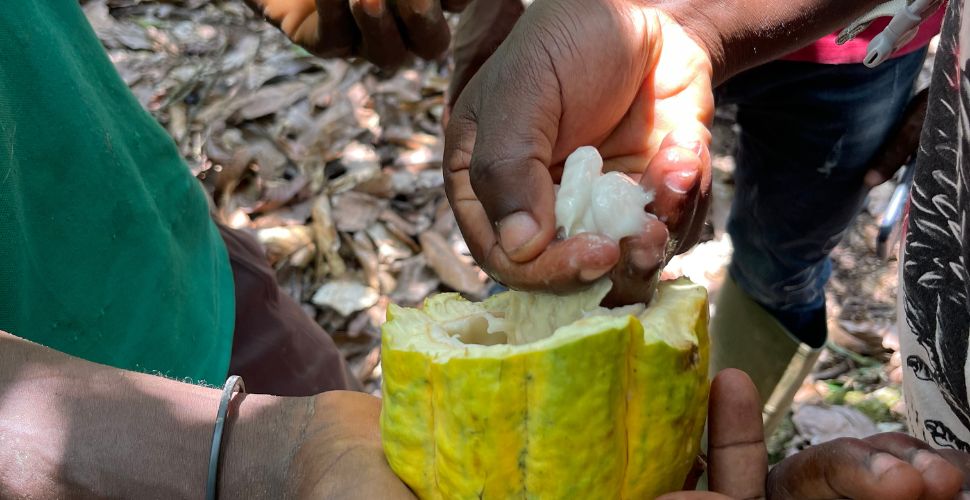The global chocolate industry has made major profits thanks to the work carried out in the cocoa-producing countries of West Africa, and yet, cocoa farming communities continue to live in poverty. Poor conditions give rise to several other concerning issues, including forced and child labor, and deforestation.
We hear a lot about what changes are needed to make the chocolate industry fairer from civil society, sustainability experts, government representatives, and companies themselves. But the most important voices in this discussion are often the hardest to hear: the voices of farming communities who are directly affected by the cocoa-sourcing practices of major chocolate companies.
That’s why I recently made a trip to the world’s leading cocoa producer country, Côte d’Ivoire, together with Fuzz Kitto from our partner organization, Be Slavery Free. We spoke to cocoa-farming communities to better understand the challenges they face and the solutions they are calling for. Here is what they told us.
This footage is courtesy of Be Slavery Free and includes clips filmed in Côte d’Ivoire and Ghana.
Farmers are not earning enough for their cocoa
I want you, who’ve been here on the ground, to tell the companies that the farmers need more pay because we’re suffering – Chief Etienne Djehi Dessiehi.
Most farmers told us how they weren’t earning enough for their cocoa, and that their communities were suffering as a result.
Some said that agents or “middlemen” were paying them as little as half the price they were supposed to be getting. They are told by buyers that “there’s no money to pay more.”
Payments are often late and farmers say they are squeezed even harder on price when they attempt to sell their products later in the harvest season.
They told us they want to see the price of cocoa increase, with some communities saying that 1,500-2000xof/kg would afford them a living income taking into account the cost of production.
Regulation must address the rising prices of goods and services
Farming communities were concerned that a rise in cocoa prices could be negated by a simultaneous rise in the prices of goods and services.
Indeed, they are already being negatively impacted by a rapid increase in production costs, including for agrochemicals and hired labor. According to a new report from Oxfam, the average unit cost of agrichemicals has increased by 43% and that of hired labor by 51%. Household expenses have also risen sharply, with food costs increasing by 50%.
Farmers we spoke to called on the government to ensure that the price of essential goods and services was regulated.
More help is needed to mitigate the impacts of climate change
Communities are feeling the adverse impacts of climate change on cocoa production, as dry seasons last increasingly long, temperatures rise, weather becomes less predictable, and the risk of flooding grows.
Farmers and community leaders suggested that authorities should facilitate the transition to more drought-resilient varieties of cocoa trees to reduce the negative consequences of climate change on the industry.
Chief Etienne Djehi Dessiehi explained that climate change is causing rivers to dry up and droughts to occur, which is affecting the productivity and lifespan of cocoa trees. He said:
We need to change and start using other varieties that are better suited to drier climates. But we’ve had no-one come and talk to us about this. Only deforestation, not climate change.
He went on to explain that reforestation is important for preventing the land from drying up which arrests cocoa trees’ growth, but that they have not received the trees needed to begin reforestation.
The impact was particularly stark in the cocoa fields in Yrozon in the western Guémon Region, where the lack of forest cover meant the plants were dying in the heat and succumbing to disease.
Communities want better education opportunities for their children
Most communities we spoke to stressed the importance of education for younger generations. Several farmers said they hoped their children could get a good education and later access better livelihood opportunities.
However, quality education is not easily accessible throughout the country for cocoa-producing communities. One farmer complained of the cost of transport for his children to attend school. Indeed, the previously cited Oxfam report recorded an increase in transportation costs of 104% and a 60% increase in education costs.
In one village, there was a brick school building that the farmers said that they had worked together to build, but a lack of funds meant it remained unfinished.
Female farmers face even greater challenges
When interacting with farming communities, I noticed a general side-lining of women in the sector. Village meetings were held with men, with women not formally present despite also being involved in cocoa farming.
We were able to meet with Clementine Boh who has set up a women’s cocoa farming cooperative – Coop Mehin-Gohi – in Guemón to better support women farmers. She explained that the members of the cooperative are squeezed hard and find it difficult to compete in the market.
Many of her members need financial support which makes sustaining the cooperative challenging. As other cooperative leaders also explained, Clementine was shouldering the burden of widespread farmer poverty and issuing loans.
The issue of gender inequality in the cocoa sector has become more widely acknowledged and discussed in recent years. Research shows that cocoa-farming households headed by women are at higher risk for poverty due to systemic barriers, including a lack of legal access to land stopping women from joining cooperatives.
Gender equality is key to sustainability both as a goal in itself and because women are recognized as change agents in communities. Creating gender equality helps communities overcome a range of threats to sustainability, from deforestation to poverty.
So what’s next for our cocoa campaign?
My conversations with farming communities really brought home the need for companies to urgently review their cocoa purchasing practices, including increasing the farmgate cocoa price.
Companies should listen to communities and find out how their existing practices are making communities more vulnerable to poverty and associated issues, such as child labor, trafficking, and deforestation.
We will continue to listen to what communities need with support from West African civil society organizations and call on companies to take responsibility for helping communities improve their conditions. Join us today by calling on the chocolate industry to step up!









Hello, Donald. Thanks for your question. You can find out what “Fairtrade” means when it comes to chocolate and what more companies should be doing here: https://www.freedomunited.org/beyond-certified-cocoa/ Thanks.
As a chocolate lover I am shocked to find that I am contributing to Modern Slavery! Am I safe in buying only Fairtrade chocolate?
The problems are complex, being concerns about erosion, falling production, deforestation and marketing. In these circumstances, conventional reductive management does not solve all the problems, send two community leaders to Africa Centre for Holistic Management – Welcome to the Africa Centre for Holistic Management… stay, learn, explore (achmonline.org) or have Allan Savory as a consultant.
Read the first sentence of the entry, then the last one. I am not sure we are going to achieve a thing…
Bitcoin will fix it … let them be paid directly via the lightning network (Wallet of Satoshi)